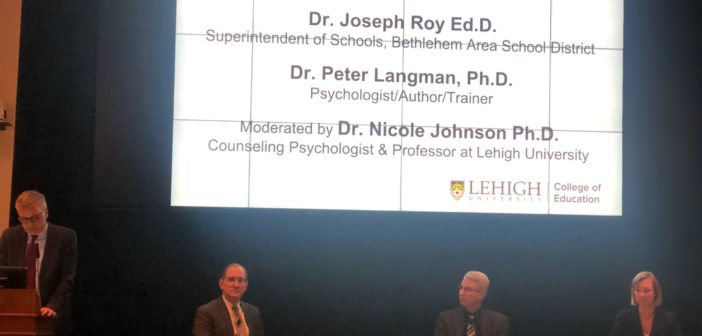Students and members of the Lehigh Valley community gathered in Packard Auditorium on March 5 to listen to issues and concerns of school shootings. The event titled “A Focus on School Shootings: What Everyone Should Know” is part of a new Crucial Conversations dialog series hosted by Lehigh’s College of Education.
The conversation was moderated by counseling psychology professor Nicole Johnson. Panel guests included Joseph Roy, superintendent of the Bethlehem school district, and Peter Langman, a psychologist and author of Why Kids Kill: Inside the Minds of School Shooters and School Shooters: Understanding High School, College, and Adult Perpetrators.
The three of them discussed the prevalence of the tragedies, the profile of what school shooters look like and what is being done now and in the future to increase safety in schools.
Johnson said it’s easy for people to not want to talk about difficult issues like school shootings, which is responsible for regression in that topic.
“Hopefully, this opens the dialogue for people to continue talking about this with their political leaders, families and friends,” Johnson said.
The more conversations that people have about school shootings, the more attention to increase policy changes to make schools safer, Johnson said.
Johnson’s areas of interest are in the prevention of gender-based violence. She said there’s often a relationship between violence against women and school shootings.
An important theme of the panel was addressing misconceptions.
“Targeted mass school shootings are actually very rare events, even though it seems like it’s more frequent because of the attention it gets,” Roy said.
Langman said there’s frequent misunderstanding and exaggerated fears regarding school shootings, so he hoped for the event to bring clarity. Overall, he said he believes schools are the safest place for our children to be.
When it comes to the profile of a school shooter, Langman said there isn’t one singular image. Instead, there are a wide range of factors including family background and what’s going on socially and psychologically in the individual’s life.
Roy said the Bethlehem school district has to manage students’ and families’ concerns during heightened times of anxiety, after the Parkland, Florida shooting for example, of where people point fingers at a likely suspect for a school shooter.
Typically, it’s the student who is depressed or may act out a little, he said.
Roy said they don’t want to overlook things; however, they don’t want to be putting labels on students just because people think they look like the ‘type.’
There are many things being done in school districts to increase safety.
Roy said the proactive and preventative side is creating positive school climates and cultures. Building strong relationships and support systems for students are also important.
The reactive side is also being done in schools. For instance, school districts are training for lockdowns, emergency crisis training and the pieces put in place in case something bad happens.
“The focus really needs to be teaching people about the warning signs,” Langman said.
Langman said often the signs are clear, explicit and direct. The more society can focus on early investigation, the more we can get troubled students the help they need to avoid situations of a school shooting.
Karen Tharp, a former teacher in the area asked Roy about his opinion on teachers carrying weapons in case of a school shooter.
Roy answered saying it’s “completely ridiculous,” which garnered applause from the Packard crowd.
Tharp said in September 2018, her school board voted to arm teachers. Shortly afterwards, Tharp and seven other moms formed a citizens group called the Tamaqua citizens for safe schools, responsible for leading the opposition against the policy in the district.
Two separate lawsuits have been filed against the school board’s decision, the first one by the Tamaqua Education Association and the other was filed by a group of parents and grandparents, forcing the school board to put the policy on hold.
“We were in contact with Langman right from the beginning when this happened with us, and he was kind enough to write a letter to our school board essentially outlining his research and why arming teachers is not effective, so we wanted to come tonight and see,” Tharp said.
Langman said we may not hear about it, but a lot is going on to try and prevent school shootings. However, there is still much to be done.






Comment policy
Comments posted to The Brown and White website are reviewed by a moderator before being approved. Incendiary speech or harassing language, including comments targeted at individuals, may be deemed unacceptable and not published. Spam and other soliciting will also be declined.
The Brown and White also reserves the right to not publish entirely anonymous comments.
1 Comment
“Roy said they don’t want to overlook things; however, they don’t want to be putting labels on students just because people think they look like the ‘type.’” This means that identification of probable shooters will not happen because of the fear of legal action if “labels” are applied. Of course some identified will not ever become shooters. Rights and freedoms must be maintained so this solution in our current culture is a pipe dream.
A more acceptable? route would be to identify those who bully, degrade, etc others. These people are easily identified and they usually act in front of others. A concurrent action would be to promote respect for everyone, i.e. people not like me. This had usually been taught at home but apparently not so much these days.
Implicit is the apparent fact that many children do not learn how to be good citizens at home. The number of such children makes it a necessity that schools pick up this task. This puts massive stress on teachers who will need administrative backup especially when some parents become recalcitrant. Private schools seem to have an easier time in accomplishing the above because students of recalcitrant parents can be removed if they or their parents are non-compliant. The price paid for the private school education provides a buy in for families. Public schools must also have a buy in or an alternative to it.
If society is not willing to do what it takes to stop school shootings we just as well accept them. To blame politicians is as ridiculous as arming teachers. Killing about 50,000 people a year in vehicle accidents has become acceptable, of great concern but acceptable. It’s not the cars or the weapons, it’s the people and the society/culture they live in.